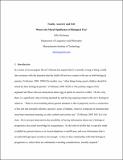| dc.contributor.author | Haslanger, Sally | |
| dc.date.accessioned | 2011-06-22T16:42:24Z | |
| dc.date.available | 2011-06-22T16:42:24Z | |
| dc.date.issued | 2009-01 | |
| dc.identifier.issn | 1944-4990 | |
| dc.identifier.uri | http://hdl.handle.net/1721.1/64650 | |
| dc.description.abstract | In a series of recent papers David Velleman has argued that it is morally wrong to bring a child
into existence with the intention that the child will not have contact with one or both biological
parents. (Velleman, 2005, 2008) Put another way, “other things being equal, children should be
raised by their biological parents.” (Velleman, 2005 362fn 3) The primary targets of his
argument are those who use anonymous donor egg or sperm to conceive a child. On his view,
there is a significant value in being parented by and having ongoing contact with one’s biological
relatives. “What is most troubling about gamete donation is that it purposely severs a connection
of the sort that normally informs a person’s sense of identity, which is composed of elements that
must bear emotional meaning, as only symbols and stories can.” (Velleman, 2005 363) Let’s be
clear. He is not just interested in the possibility of having information about one’s biological
progenitors, but actual knowledge by acquaintance. So the kind of profile that is typically made
available by gamete donors or in closed adoptions is insufficient, and even information that is
revealed through open records is not enough. A face-to-face relationship with both biological
progenitors is, unless there are substantial overriding considerations, morally required. | en_US |
| dc.language.iso | en_US | |
| dc.publisher | Alliance for the Study of Adoption and Culture | en_US |
| dc.relation.isversionof | http://www.english.pitt.edu/adoption&culture/Volume_2.html | en_US |
| dc.rights | Creative Commons Attribution-Noncommercial-Share Alike 3.0 | en_US |
| dc.rights.uri | http://creativecommons.org/licenses/by-nc-sa/3.0/ | en_US |
| dc.source | Prof. Haslinger via Michelle Baildon | en_US |
| dc.title | Family, Ancestry and Self: What is the Moral Significance of Biological Ties | en_US |
| dc.type | Article | en_US |
| dc.identifier.citation | Haslanger, Sally. "Family, Ancestry and Self: What is the Moral Significance of Biological Ties?" Adoption & Culture (2009) 2.1. | en_US |
| dc.contributor.department | Massachusetts Institute of Technology. Department of Linguistics and Philosophy | en_US |
| dc.contributor.approver | Haslanger, Sally | |
| dc.contributor.mitauthor | Haslanger, Sally | |
| dc.relation.journal | Adoption & Culture | en_US |
| dc.eprint.version | Author's final manuscript | en_US |
| dc.type.uri | http://purl.org/eprint/type/JournalArticle | en_US |
| dspace.orderedauthors | Haslanger, Sally | |
| mit.license | OPEN_ACCESS_POLICY | en_US |
| mit.metadata.status | Complete | |
